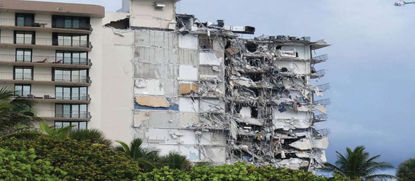
The Penalty Dilemma of Replacement Cost Valuation at Time of Loss
By Mark Phillips / Published June 2023
Naturally, we all were stunned to watch the live nighttime phone video of a wretched nightmare. Champlain Towers South, a 13-story oceanfront residential building in Miami-Dade County, partially collapsed overnight on June 24, 2021. The rest of the building was demolished 10 days later due to concerns over structural integrity.
What’s not so immediate to our senses, unless you’re the insured owners/board members, is what the policy limits of the South Towers replacement cost policy were stated at. Amidst the endless fiduciary (board members) and maintenance concerns of a 40-year old structure, relevant code enforcements, past engineering reports, and all the delving into the building’s safety and capacity to be structurally sound into the future is what will be its true replacement cost.
This is one of the most critical demands in a property replacement cost policy with “coinsurance requirements.” When the insured/board members are in a rush to get affordable premiums at every renewal date of the pol-icy, they may be unwisely coaxed into a fiduciary failure under this contract which is their only “asset for recovery.” This failure is the wrecking ball that will lessen the policy coverage payment for the loss recovery. And yet it is one of the first contractual obligations in the policy language used in calculations of loss payment.
 As you will see in your policy language where it states your “Duties at Time of Loss” (bolded and clearly stated in your contract), the insurance company’s rights are protected as they will have the right to correctly, in “real time” and with numerous resources and experts, determine what the accurate replacement cost is at time of loss adjustments. Thus, they retain the right at time of loss to stipulate whether your policy building value amounts in your policy contract meet the requirements of the coinsurance clause of the policy.
As you will see in your policy language where it states your “Duties at Time of Loss” (bolded and clearly stated in your contract), the insurance company’s rights are protected as they will have the right to correctly, in “real time” and with numerous resources and experts, determine what the accurate replacement cost is at time of loss adjustments. Thus, they retain the right at time of loss to stipulate whether your policy building value amounts in your policy contract meet the requirements of the coinsurance clause of the policy.
And that’s the contract language that always presents a testing ground for policyholders and their watchcare over the valuation demands of their insurance contract.
As the equation on the preceding page displays in as simple math as possible this is one of the most demanding contractual responsibilities of the insured (after you absorb your loss deductible cost). The failure to meet its contractual obligations could literally present board members/unit owners with the dilemma of a huge penalty in the final loss calculations under the policy language.
The “Claims Bond Files” strive to point with accuracy and sound research—in real-time applications—to proactive fiduciary choices and behaviors that help insureds meet the demands of of their policy needed for maximum replacement cost recovery.
 The Claims Bond Files Feature
The Claims Bond Files Feature
By Suzanne Ganier
Suzanne Ganier is a recovering attorney who has been working in the insurance industry for over 25 years. She provides expert and consulting services nationwide and is a licensed independent adjuster in over a dozen states, including Florida. She lives in Rosemary Beach, Florida. She can be reached at GanierEnterprises@outlook.com.
A Tale of Two Class Actions
It certainly wasn’t the best of times. And for me, it was the worst of times. “Should I wear my jewelry? Do I need to bring a toothbrush?” were questions running through my head that morning. How did I get here? Was it possible that I might end up getting arrested today for doing my job? How had these two class actions filed purportedly to recover damages for policyholders devolved into this territorial fight between two groups of attorneys?
Let me explain …When Hurricane Katrina rumbled across the New Orleans area, it caused unprecedented damage, including knocking out all means of communication. Louisiana Citizens Property Insurance Company (Louisiana Citizens), the insurer of last resort, insured hundreds of thousands of homes in the damaged area. Immediately after the storm, it was impossible for policyholders to make claims due to the lack of means of communication. Once policyholders were able to make claims, the lack of reliable means of communication, available adjusters, and the sheer number of damaged homes prevented Louisiana Citizens from being able to begin adjusting claims. This was a big problem because Louisiana law at the time required all insurers to begin adjusting claims within 14 days of being notified of the loss and the policyholder making a claim. Failure to adhere to this deadline rendered Louisiana Citizens liable to the policyholder for penalties, either actual damages caused by the delay or $5,000.
But 14 days after the storm, the New Orleans area was still in chaos. Landline and cellular phone service were spotty at best. There was still no electricity. It wasn’t safe for people to be in many damaged areas. Emergency personnel were still trying to locate missing people. Adjusting claims was not the top priority at this point.
Nevertheless, the law is the law, so two class action lawsuits were filed against Louisiana Citizens seeking $5,000 for every Louisiana Citizens policyholder who did not have adjustment on their claim begun within 14 days after the policyholder provided notice of loss. Both class actions sought the same damages for the same policyholders, but each suit was brought by a separate group of attorneys. Seems odd, right?
Here’s where it got really interesting. Louisiana doesn’t have counties; it has parishes. And each parish is independent of the others. So, when the two class action lawsuits were filed, one in Jefferson Parish and the other in Orleans Parish, it was like the two suits had been
filed in two separate states. Any-thing that happened in one parish had no impact on the case in the other parish. This unique fact about Louisiana was going to become very important.
Flash forward to 2008. I was now the Director of Litigation for Louisiana Citizens, and I was responsible for working with Louisiana Citizens’ attorneys to resolve both class actions. In the fall of 2008, that’s just what we tried to do.
The attorneys who had filed the class action in Orleans Parish contacted the Louisiana Citizens’ legal team and presented a way to resolve the Orleans Parish class action in a way that would also legally end the Jefferson Parish class action. (The details of how this would be accomplished are detailed, technical, and frankly, boring.) We worked with the Orleans Parish attorneys to carry out the plan, and the judge in Orleans Parish approved the resolution. It was so easy, or so I thought.
Not surprisingly, the attorneys who brought the class action in Jefferson Parish caught wind of the machinations across the river, and they were furious. You might wonder why they were so furious. Louisiana Citizens was going to be paying their clients the damages mandated by law. That was the purpose of filing the suit, right? They should have been thrilled, right?
I’m no mind reader, and no one ever told me specifically that this was the reason these attorneys were upset, but perhaps they were upset about the attorney’s fees they were not going to receive. By the time we had settled the Orleans Parish class action, the judge had entered an order in the Jefferson Parish suit ordering Louisiana Citizens to pay $96.5 million in damages. Under most standard fee agreements, the Jefferson Parish attorneys would be entitled to receive between 30 percent and 40 percent of the total for fees. That’s about $29 million to $38.6 million in attorney’s fees lost with the settlement of the Orleans Parish case.
The Jefferson Parish attorneys ran immediately to the judge presiding over the class action there. They argued that the actions taken in Orleans Parish were illegal and should not be given legal effect. The judge, who might have been more furious than the Jefferson Parish attorneys, agreed with their argument and ruled that the settlement had no effect.
Things then went from interesting to nuts…As I mentioned, each parish in Louisiana is a wholly separate entity, so legal rulings in one parish have no impact on the proceedings in another parish. The effect of this became immediately apparent as the judges in each parish began entering dueling orders. The judge in Orleans Parish ordered Louisiana Citizens to continue doing all necessary actions to effectuate the settlement there. In contrast, the judge in Jefferson Parish ordered Louisiana Citizens not to do anything to affect the settlement in Orleans Parish. At one point, I was subpoenaed to testify in the Orleans Parish matter, but the Jefferson Parish judge ordered me not to appear in Orleans Parish and said that I would be held in criminal contempt and jailed if I didn’t comply with his order. Of course, if I didn’t comply with the subpoena in Orleans Parish, I could be held in contempt (and possibly jailed) there.
So, this is why I threw a toothbrush in my bag, and why I didn’t wear any jewelry, including my engagement and wedding rings, in case I actually ended up going to jail.
Part 2—the end of this Tale—continues in the next issue of “The Claims Bond Files.”
Mark Phillips
Founder/Publisher, Claims GPS
With 30 years of expansive work in the property and casualty field of insurance, his claims adjusting experience since 1996 has dealt with large property damage and business interruption losses arising from numerous catastrophic disasters throughout America. He is author/creator of the Claims GPS educational system, which offers policyholders guidance, preparation, and success in fulfilling their duties during their claims recovery event.
He has created the innovative case study workshop titled “Duties of the Insured: Coconut Twist—The Truth and Trauma of a Hurricane Claim,” graphically displaying the errors and omissions liabilities for directors and officers due to lack of preparation for recovery under their commercial insurance policy.
For more information about Claims GPS, contact Mark Phillips at 813-532-5023 or email mphillipswka@yahoo.com.






